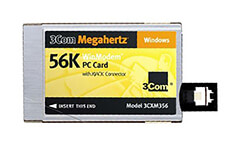PCMCIA
Stands for "Personal Computer Memory Card International Association." PCMCIA was an organization that focused on creating expansion card standards for portable computers. It began in 1989 and lasted until 2010 when it was acquired by the USB Implementers Forum (USB-IF).
The most notable product developed by the Personal Computer Memory Card International Association is the PCMCIA card (commonly called a "PC card"), which provided expansion capabilities for laptops. The card could be inserted into a PCMCIA slot on the side of a laptop, providing additional memory or connectivity. There were three versions of the PCMCIA card standard:
- Type I - 3.3 mm thick - used for memory expansion
- Type II - 5.0 mm thick - most common; used for NICs (Ethernet cards), modems, and sound cards
- Type III - 3.3 mm thick - used for ATA hard drives
Larger PCMCIA slots were backward compatible with smaller cards. For example, a Type III slot could support Type 1, 2, and 3 cards, and a Type II slot could support Type 1 and 2 cards.
In the 1990s, PCMCIA cards were a common means of adding extra functionality to laptops. But as laptop components became smaller, manufacturers were able to fit all the necessary components into their laptops, making PCMCIA cards unnecessary. Additionally, many peripherals that previously required a PCMCIA card became available in USB versions. In the early 2000s, the trend toward thinner and lighter laptops eventually made PCMCIA cards obsolete.
 Test Your Knowledge
Test Your Knowledge